Peter MALONE
Saturday, 18 September 2021 19:58
Ong Bak 3
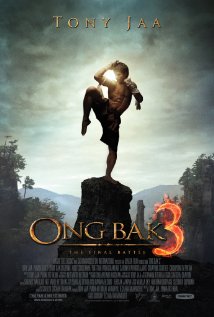
ONG-BAK 3
Thailand, 2010, 99 minutes, Colour.
Tony Jaa, Primorata Jejudom, Dan Chupong, Nirut Sirichanya.
Directed by Tony Jaa, Panna Rittikai.
This is the third film in the series, while it could be seen as stand-alone but makes sense, of course, principally in the aftermath of the first two films.
The film is a star vehicle’s for martial arts actor, Tony Jaa. In each film, he has many, many opportunities to exhibit his fighting skills.
The theme throughout the film’s is the relationship between Tony Jaa’s Tien and his father, the attacks on his father, the cruelty of the usurper, the spirit of his father leading the son to survive, a great deal of suffering (which makes The Passion of the Christ seem milder), and the rescue of Tien, his being cared for by the young woman of the village, and the Guru leading him into recovery, physical strength, moral strength, by meditation and contemplation. The recurring images of the Buddha, with different facial expressions, symbolising Tien’s growth and the film’s reliance on some Buddhist spirituality.
The tyrant himself, fearful, remembering Tien’s father, being cruel to him, yet receiving challenges and having physical and mental nightmares until his defeat.
A film for those interested in this kind of tie storytelling and for Tony Jaa’s martial arts skills.
Published in Movie Reviews
Published in
Movie Reviews
Tagged under
Saturday, 18 September 2021 19:58
House of the Seven Hawks
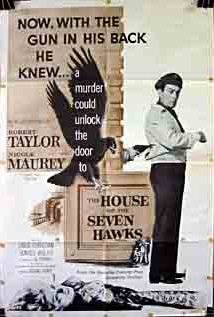
HOUSE OF THE SEVEN HAWKS
US, 1959, 92 minutes, Black and white.
Robert Taylor, Nicole Maurey, Linda Christian, Donald Wolfit, David Kossoff, Eric Pohlman.
Directed by Richard Thorpe.
It is said that Robert Taylor had the longest contract with MGM, beginning in the 1930s, on through the 40s and 50s, and well into the 60s, but with minor roles. This film was one of his last. While he still had some film roles, he settled for television.
This film is based on the novel by thriller-writer Victor Canning (film version, Venetian Bird, with Richard Todd). It is set on the North Sea, opening in England, but most of the film shot in the Netherlands. It was directed by Richard Thorpe, who also began directing Robert Taylor in the 1930s, directed him in a number of costume action dramas in the 1950s – and Thorpe continued directing, comedies and musicals until 1967.
The supporting cast is international. The plot involves a captain moving around the English coast, the police having an eye on him as regards going to the continent, his becoming involved in a plot in a search for sunken treasure. The title refers to a clue as to the location of the sunken vessel.
1. An action adventure? The style of the 1950s and 60s? Black-and-white photography, British and Dutch locations?
2. Robert Taylor vehicle, the solid American hero, in England, with his boat, contracts and advertising, passengers, forbidden to go to the continent? Severe British authorities? The situation with the dead man, the instructions that he found, concealing them, the plan to investigate?
3. The Dutch police, taking him in, the interrogations, suspicions? His joining forces with them?
4. The mysterious woman on the boat, taking the instructions – and later encounters, doublecross, her death?
5. The second woman, the daughter of the dead man, his being undercover police, information from England, bringing it back, the issue of the treasure and its value? The relationship with John?
6. The captain, sinister, his connections, the background of the war, his friend insinuating himself?
7. John’s friend, the contacts, the doublecross?
8. Going to the site of the sunken boat, the clues finding it, John and the policeman’s daughter?
9. Finding the treasure, the confrontation, the police, the resolution of the plot and the crime?
Published in Movie Reviews
Published in
Movie Reviews
Tagged under
Saturday, 18 September 2021 19:58
Horizontal Lieutenant, The
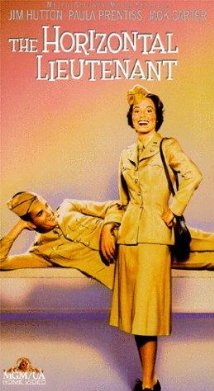
THE HORIZONTAL LIEUTENANT
US, 1961, 90 minutes, Colour.
Jim Hutton, Paul Prentiss, Jack Carter, Jim Backus, Charles Mc Graw, Myoshi Umeki.
Directed by Richard Thorpe.
The Horizontal Lieutenant is a slight comedy, given the star treatment, colour and Cinemascope, by MGM at the beginning of the 1960s. The film was directed by Richard Thorpe who had been directing MGM films since the 1930s, a wide range of genre films, especially with Robert Taylor.
Jim Hutton was emerging as a pleasant on-screen comedian but died early at the end of the 1970s. He made several films with Paul Prentiss, a strong comedian over the decades. There are several veteran character actors in support including Jim Backus as the commander, Charles Mc Graw as the Colonel, and Oscar-winning Myoshi Umeki (Sayonara).
Jim Hutton is a romantic lead, tall and gangly, and prone to all kind of pratfalls. Not good at baseball, he is transferred to an island where nothing is happening, with a quest to find a local who is stealing some of the luxury goods from the Americans. This leads to comic situations and some slapstick comedy. Echoes of Teahouse of the August Moon and Sayonara.
1. 1960s comedy? Surface comedy? Memories of World War II? Becoming more distant?
2. Hawaiian locations, the islands in the Pacific? Musical score?
3. The title, the story of Merle Wye? His narration and his ambitions visualised – but not in reality? At the baseball game, his being hit, carried away horizontal, in the hospital, remembering Molly, coming to, with Molly? Her nicknames, his memories of her?
4. His role in Intelligence, as assistant? The commander wanting him to go to another island because he was not good at baseball? His making a great deal out of the transfer? His learning the truth about it as dead-end? The discussions with Molly, his final evening, going to the club, flirting? Her discovering the truth about where he was going, walking out?
5. Molly, the past, friendship with Merle, as a nurse, her popularity? Attracted to Merle? Later transferred to the island, encountering him again, the off and on again relationship? His boasting and pretending? The picnic on the cliff, returning later, the real Kobayashi? Merle fighting and losing? Molly throwing the net? Success?
6. Merle, the commander and his cigar on the plane, the determination to capture Kobayashi? Not driving, crashing into the colonel’s office? Merle’s predecessor staying on? The interrogations, the translations, the drinking? The Colonel and his severity, urging Merle on?
7. Merle, his replacement, forcing him to drive, crashing into the Colonel’s office? Their relaxed way, the interrogations and the search?
8. The local Japanese Americans, helping, the man sent to be undercover, his glasses, conspicuous, friendship with Akiko, knowing the truth, the relationship?
9. Kobayashi, the stealing of the luxury goods, irritation to the Americans? Their quest?
10. The acrobatic performance? Trying to indicate to Merle and his friend that this was Kobayashi? Their obtuseness this? Finally going to question him, his knocking them out, the various pursuits, Merle finding him, the fight and his losing every round?
11. Molly, the men attracted to her, especially the Colonel? Finishing up with Merle?
Published in Movie Reviews
Published in
Movie Reviews
Tagged under
Saturday, 18 September 2021 19:58
Freeheld
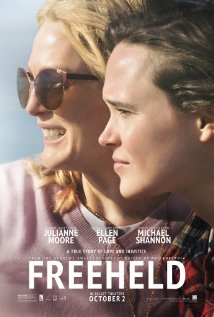
FREEHELD
US, 2015, 103 minutes, Colour.
Julianne Moore, Ellen Page, Michael Shannon, Steve Carell, Josh Charles, Luke Grimes, Kelly Deadmon, Dennis Boutsikaris, William Sadler.
Directed by Peter Sollett.
The title is intriguing but not really helpful until we have seen the film. It seems to relate to the two central characters, Laurel (Julianne Moore) and Stacie (Ellen Page) and their relationship, and issues of civil equality. But, then, at the meeting of the Ocean County Council, underneath the plaques with the names of the councillors was the title, Freeholders. Ultimately, there is a civil liberties and legislation clash between citizens and Council.
The film has several genres in the plot development.
Freeheld opens as a police investigation drama with touches of the thriller, the career of Laurel, who had been in the Ocean County, New Jersey, police force for over 20 years, working with her partner, Dane (Michael Shannon). We see them in action, in raids, courageous. And we see the authorities congratulating the pair but the Chief looking only at the man, bypassing the woman. We are also shown Laurel doing her research work at home, coming up with leads and the follow through which involves her being dragged along the street holding onto a car, then a bad cop/good cop method where she is able to elicit the information needed. Laurel and Dane get on very well together, he having a crush on her.
After work, Laurel goes to a local gay club. She notices a young woman, Stacie, and joins in conversation, dancing, and they go home together, developing their relationship and, after a year, with Stacie doing garage work (being shown able to change a wheel more quickly than the expert at the garage) and the couple deciding to buy a house and renovate it. It is at this juncture that Dane discovers the truth, is momentarily shocked, but disappointed that she had not confided in him as he had confided personal matters to her.
Michael Shannon is very effective as Dane, portraying a good guy when, as so frequently in films, he can be extraordinarily sinister (as in 99 Homes, made at this time).
Freeheld then develops the theme of gay relationships, friendship, love, intimacy.
But then there is a transition when Laurel complains of a sore nerve and is urged to go to the doctor. She has lung cancer, quite advanced. In 2014, Julianne Moore gave her Oscar-winning performance as Alice, a 50-year-old succumbing to Alzheimer’s disease, Still Alice. Here she puts her deepest self into the performance, audiences convinced that she is terminally ill, going through the chemotherapy, accepting the limitations on her lifetime, being helped by the, at first, unbelieving Stacie.
It is here that the film becomes political. Laurel has decided, according to New Jersey legislation of 2005, to leave her pension to Stacey so that she can pay the mortgage on their house and live there. The local council, five male members, the Freeholders, hear the petition presented personally by Laurel and reject it. They offer different reasons, principles about the same-sex relationships, the possibility that this would lead to legislation on same-sex marriage, religious principles and their invoking that this is what the majority of citizens, older, of Ocean County believe in.
A campaigner, Steven Goldstein, suddenly erupts into the film. He is played vividly by Steve Carell, reminding people that he is middle-aged, middle-class, white, Jewish and gay. One of his lines is to remind people that his protests, rounding up followers, placards, slogans, shouting and singing, are “political theatre”. He takes up the cause of Laurel and Stacie even though Laurel will not endorse his campaign for same-sex marriage. What she is after – and she makes two speeches to the council, one when she is very sick – is gender equality.
There are two main approaches to awareness about social issues, campaigns and principles: some take the crusading path, as do the protesters in this film; others take the education path, telling stories, inviting people to step into the shoes of people whose causes are being promoted. This is what Freeheld does. With the expert performances, the modes of storytelling, audiences are invited to step into Laurel’s shoes and walk with her, as a person, in her career, in her sexual orientation, in her partnership, in her illness, in her fight for the issue of her pension going to her partner.
The advantage of this kind of storytelling is that it gives some possible compassion for people whether an audience agrees with them or not.
1. A true story? Actual characters? The political situation, social equality?
2. New Jersey, Ocean County, the police, the streets, offices? Homes, bars? Council meetings? Hospitals? The Atlantic Coast? The musical score?
3. The title, Laurel and Stacie, equality and freedom? The title for the local Councillors, Freeholders?
4. The screenplay, several genres, in the development of the characters and situations?
5. Laurel, her many years in the police force, her partnership with Dane, their work together, the raids, the work being acknowledged, the men being honoured, the women being ignored? Laurel and her work, her ambitions to become Lieutenant? The further investigations, her ideas, working at home, photos and yearbooks, finding leads, accosting the young woman in the car, her being dragged along? The plan for the rest of the thugs? The girl, Laurel and Jane, the good cop/bad cop routine? Laurel getting the girl’s confidence, the information? Laurel and her bond with Dane, his regard for her, her relationship with the other members of the force?
6. Laurel, going to the club, noticing Stacie, the bond with her, dancing, the attraction, their talking, Laurel seeing the gay policeman, going out for a smoke, going home with Stacie, the sexual relationship, the intimacy, Stacie looking at the albums of Laurel’s achievement, going to answer the phone, Laurel and the clash, her control, later apologies?
7. Time passing, the bond, ordinary life, touches of intimacy? The love developing, the decision to buy that house, the estate agent and disapproval, looking at the house, buying it, painting and redecorating? Dane and his bringing the shrub? Finding out about Stacie, his being taken aback? Upset that Laurel could not confide in him while he had confided about discovering his child? Stacie, meeting Dane? Her mother helping, settling in, getting the dog, watching the sport on the television?
8. The cancer story? The onset, treatment, chemotherapy, hair loss…? Laurel’s response? Stacie’s reaction? Talking, care, walking along the beach?
9. The issue of the pension, the legislation, public opinion about gay partners? The opinions in Ocean County? The meeting of the Council, Brian and his previous meetings with Laurel, a member of the Freeholders? The other members, their convictions, principles, religious attitudes? Discussions? The vote?
10. The police reaction, Dane and his request that they donate sick days’ pay for Laurel? His giving the example, the bigoted policeman, his arguments, homophobic, finally conceding one day? The others? The invitation to go to the protest? The Chief and his shutting his door? The gay policeman, covering up previously, decision to go? The others joining him? Their presence at the Council meeting?
11. The chief and presenting Laurel with her promotion as Lieutenant?
12. The sudden appearance of Steven Goldstein? Erupting into the cause, gay, Jewish, white, middle-class? Earnest, collecting his followers? His statement that all of his protest work was all political theatre? Slogans, placards, presence at the meeting, the chants about the Council having the power?
13. Bryan, the discussion with his daughter, giving Dane the information about the multiple pensions of the councillors? The role of the journalist, interview, photos, the headlines, influence on public opinion?
14. Dane and his commitment to Laurel’s cause, the background work, investigating the pensions of the Councillors, his continued presence and support?
15. Laurel, her stances, becoming sicker, her emphasis on equality rather than gay marriage?
16. The background of Stacie, her age, working in the garage, the competition in changing the wheel, the boss defending her from the hoon drivers?
17. Steve, as a person, with the Council, making the issues clear? Direct, his appeal to Laurel?
18. The meeting, Stacie’s mother coming? Dane his presence? Preparing Laurel, the shaving of her hair, the hood, coming to the meeting, his speech?
19. The Council, the contact with the Governor, the absent member, the discussions, the plea, the pressures on each of the Councillors, Bryan’s vote?
20. Laurel’s death, Stacie in the house and her memories?
21. The final credits, and the range of photos of the real Laurel and Stacie?
Published in Movie Reviews
Published in
Movie Reviews
Tagged under
Saturday, 18 September 2021 19:58
Man Up
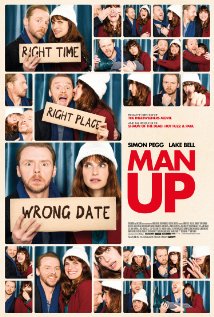
MAN UP
UK, 2015, 88 minutes, Colour.
Lake Bell, Simon Pegg, Rory Kinnear, Olivia Williams, Ophelia Lovibond, Henry Lloyd- Hughes, Sharon Horgan, Stephen Campbell Moore, Ken Stott, Harriet Walter.
Directed by Ben Palmer.
Man Up as a title does not do justice to this comedy, with serious undertones. It is an amusing film with an appeal for both men and women in middle age, whether undergoing their crisis, or anticipating one, or just interested how men and women tick at this age.
It is something of a comedy of errors. Lake Bell is particularly good as Nancy, and with a British accent, a 34-year-old who has been for some years getting over a broken relationship, has a career as a journalist, something we don’t see much of, and is being urged on, especially by her married sister, to date and to make some romantic connections. We first see her invited to an engagement party, backing out, having room service at the hotel, being hounded to go down and being pushed to meet someone with whom she has no rapport.
Next day, on the train, she meets a rather prissy young career woman, Jessica (Olivia Lovibond) who is reading a bestseller on relationships, giving Nancy a little lecture, and leaving the book for Nancy to pick up. Jessica has planned to meet on a blind date a man under the clock at Waterloo Station. As Nancy hurries to give back the book (while Jessica is buying another one), Jack (Simon Pegg), who has been waiting, mistakes Nancy for Jessica. And the cautious Nancy throws caution to the winds and goes on a date with Jack, he incessantly talking, taking her to a bar, their having drinks, going to a bowling alley and exercising rivalry, going to another bar when Nancy meets Sean (Rory Kinnear in a somewhat over the top comic performance) who has had a crush on Nancy and causes her to reveal the truth before she was ready.
Some more rivalry and an encounter with Jack’s ex-wife and her boyfriend – with Nancy deciding to play up her connection with Jack, much to the amazement of his ex-wife, and with some slapstick consequences.
In the meantime, Nancy should have been at her parents’ 40th wedding anniversary to give the speech. Eventually she does get there, but so does Jack, relying on the good offices of Sean (which he should not have), and things get more or less sorted out to everyone’s satisfaction (except Sean’s).
There is quite an amount of witty and entertaining dialogue, audiences probably enjoying the farcical situations and the mixups, and probably pleased to see romance winning out for this middle-aged couple.
1. A brief romantic comedy? Characters, situations?
2. The age of the characters, a film for middle-aged audiences?
3. The comedy, situations, values, search for love and companionship?
4. The London settings, homes, bars, the streets, trains? The country, homes? The musical score?
5. Nancy, her age, Lake Bell and her English accent, timing? The situation, 34, the broken relationship, preparing to go to the engagement party, retreating, room service and the jokes with the man on the staff, the sister’s phone call, urging her to go down? The couple, her blunt remarks? A date, his gawky manner?
6. Nancy and her parents, 40 years married, preparing her speech, a relationship with her sister and brother-in-law, promises about making the speech?
7. On the train, the encounter with Jessica, talking on the phone, Jessica and the book, self-help, the bestseller, Jessica straightforward, interviewing Nancy? Nancy dozing, waking, the book with the note? Jessica’s comment about her negative attitudes? Nancy chasing Jessica at Waterloo Station? Jessica buying the new book? Under the clock, Jack recognising the book?
8. The mistake, the decision to carry on, the strength of her pretence, coming alive, responding to Jack and his talk?
9. Jack, 40, talking, hope for the date, his friend setting it up, his explanations and Nancy becoming Jessica?
10. Drinks, sharing, leaving the bar? Going to the bowling alley, the rivalry? Enjoying each other’s company? Going to the other bar, the encounter with Sean, the encounter in the toilet, Sean and his bribing Nancy, his crush on her? Jack discovering them, the truth and its effect?
11. Jack upset, the consequences? Going back to the bar because of the lost bag, the bike and the taxi? Exchanging lists?
12. Jack’s wife, boyfriend, the story, Nancy carrying on, pretending to be the girlfriend, talking and flirting, the dancing, accusing the wife of the affair? Jack in the toilet, crying? Slapstick, the extinguisher and the foam over the couple?
13. Jack, his attitude, changing, upset, missing Nancy, going to see Sean for her address? Driving the car with him, his recklessness? His dropping Jack at the wrong address?
14. Nancy, going to the train, the phone calls, the party?
15. The parents, their age, experience, the way they got on with each other, the banter? The father making a speech? Her sister’s response? Nancy arriving, her speech, telling the story and everybody responding?
16. Sean’s presence, Nancy rejecting him?
17. Jack, asking for Nancy’s address, the young man who had her as a babysitter, the running to the house?
18. The ousting of Sean? The reconciliation with Jack?
19. Everybody happy, the young people in the window, everybody dancing?
Published in Movie Reviews
Published in
Movie Reviews
Tagged under
Saturday, 18 September 2021 19:58
5 to 7
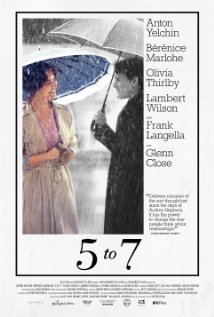
5 TO 7
US, 2014, 95 minutes, Colour.
Anton Yelchin, Berenice Marlohe, Lambert Wilson, Olivia Thirlby, Glenn Close, Frank Langella, Erich Stoltz, Jocelyn De Boer.
Directed by Victor Levin.
“I love you” may seem the same, exactly the same, as the French phrase “Je t’aime”. This film reminds us they are not exactly the same at all, the cultural differences between the English language and the French language coming to the fore, but American moral stances compared with French moral stances, as we have often heard from the French, have quite a number of differences.
Perhaps this is not the best introduction to a film review of 5 to 7. But this reviewer liked it very much indeed, surprisingly so.
The phrase “5 to 7” is used by the French to indicate a time in the afternoon, between work hours and whatever is to take place in the evening, when affairs can be arranged and lived out. All Americans might have affairs, but this more explicit approach by the French, and the alleged rules by which the French have their 5 to 7 soirées, differs from the Americans and their more explicit moral stances.
Brian Bloom is a young would-be author, from a wealthy background, getting lots of rejection slips which he pastes on his wall, who encounters a Frenchwoman as they both have a cigarette in an afternoon break from work. He is immediately attracted. And so is the audience. She is Arielle (the name of The Little Mermaid as Brian notes) and is played by French actress Berenice Marlohe who was a strikingly memorable Bond girl in Skyfall who had quite an unhappy end. While she has the potential for an unhappy ending here, she is a woman who has an extraordinary smile, more than fulfilling the cliche saying that her smile would light up a room – and beyond. Fortunately for us all, and for Brian, she smiles a lot during this film.
He is 23. She is 34. And she is married and has two young children. But, in the alleged French manner, so attracted is she by Brian, that she suggests a 5 to 7 arrangement, which he eagerly accepts. They meet frequently, enjoying each other’s company, going to art galleries, she blindfolding him to test his palette for red and white wines (he mistakes a white for a red) and then tests her for beer and Guinness (and she mistakes a Guinness for ordinary beer).
And her husband, Valerey (Lambert Wilson)? He also has a 5 to 7 arrangement with a young American editor, Jane (Olivia Thirlby). Personal relationships and social relationships are all carried out with the best of all possible good manners, Brian is invited to a meal at home by Valerey. And Brian takes Arielle’s children out and teaches them some elements of baseball.
Of course, the question is, how can such arrangements continue – if they are purely sexual arrangements, they could go on forever until one or other tires. But, if genuine love enters in, with a mixture of possessiveness and single fidelity, what could happen?
Which is what happens between Brian and Arielle. Again, civilised manners, except when Valerey momentarily strikes Brian. Brian declares his absolute love – but what of Arielle? The best thing for a reviewer to say is: go to see the film to find out and check how this ending fits with romantic sensitivities and moral sensibilities. Suffice to say that the film’s story goes on little longer than might have been expected, which gives a little more depth to the experience of all concerned.
An extra bonus for the audience is the presence of Glenn Close and Franklin Langella as Brian’s parents, he continually complaining about something, especially the price of parking and taxis in New York City, and also about his son’s relationship with a married woman. Glenn Close reminds us of what a good and significant actress she is.
The good memories from this film certainly last beyond 5 to 7.
1. The title? English-language interpretation? French culture interpretation?
2. I love you and je t’aime, the different meanings and implications?
3. The New York story, Brian’s story, his family, wealthy background, Jewish background, his aspiring to be a writer, his apartment, his rejection slips on the wall, his hopes for a career?
4. A New York story for French people working in the city, in the diplomatic corps? Arielle, her life, marriage, husband, children, seeing New York as an exile, the open marriage, affairs from 5 to 7?
5. Brian and his character, his age, rejections, hopes, the chance meeting with Arielle, talking, smoking, the invitation, his returning to the rendezvous, the arrangements, following it up, the differences in their characters, yet the affair? The rules, Brian meeting Valerey, invitation to dinner, meeting Jane? His playing with the children, baseball? The effect on him, the range of outings, the galleries, sharing, testing wine, testing beer? His winning the award, joy, the ceremony, his parents present – and his father arguing, Arielle and Valerey both there, Jane and her editor, introducing Brian to him, the possibilities for publication? Brian and his decision, consulting Jane about the ring, buying it, the proposal, Arielle accepting? His going to the hotel, the letter from her, her changing her mind, her children? His love, hurt?
6. Arielle and her age, vivacious, her smile? Her life before marriage, surviving, with Valerey, with the children, Brian and the baseball, the outings, wine and beer, the award, sharing her love with Brian, the intimacy? The dinner? Brian’s proposal, her acceptance, change of heart, the letter?
7. Jane, her relationship with Valerey, 25 years old, and the dinner, her work as an editor, introducing Brian to her publisher, advising Brian what to say, guiding him, editing?
8. Brian’s parents, the characters, discussions, love for their son, meeting Arielle, the mother being charmed, the father and his principles, at the award, his still grumbling? His consciousness of prices for taxis and parking?
9. The aftermath, Valerey striking Brian on the face? Planning, writing, the decision to make something out of himself?
10. Time passing, the publication of The Mermaid, Jane and excitement, Brian and his success, Arielle passing the shop and seeing the cover?
11. The chance meeting at the gallery, Brian and his wife and child, Arielle and Valerey and their children, the conversation, shaking hands, Arielle and her love, still wearing the ring?
12. Issues of marriage, open marriage, fidelity, family?
Published in Movie Reviews
Published in
Movie Reviews
Tagged under
Saturday, 18 September 2021 19:58
Darby's Rangers

DARBY'S RANGERS
US, 1958, 121 minutes, Black and white.
James Garner, Jack Warden, Etchika Choreau, Edd Byrnes, Venetia Stevenson, Torin Thatcher, Peter Brown, Joan Elan, Corey Allen, Stuart Whitman, Murray Hamilton, Andrea King, Reginald Owen, Frida Inescort.
Directed by William A.Wellman.
William A.Wellman directed films about World War I including the first Oscar-winner, Wings. He also directed The Story of’s GI Joe at the end of World War II. his other World War II films include Battleground and Doug bees ranges, Derbies Rangers, a film about a special squad of commandos who were instrumental in assisting the landings in Italy in 1943, helping in the freeing of Naples, but sustaining many casualties later.
James Garner, in an early film, portrays Bill Darby, the energetic power behind the Rangers, sharing their training and their hard fighting with them, while also being a father-figure to some of the men. He is assisted by Jack Warden.
The first half of the film establishes the characters, especially in yanks “over there” and their being sexual hunters. This means that they are a mixture of exploitation and genuine falling in love. This part of the film also has strong sequences of the tough training. This took place in Scotland. The second part of the film emphasises the action.
1. A World War II story, American commandos, British training, their personal lives and relationships, the experience of war, especially in Italy?
2. The work of the director, his World War I experience and films, his World War II films like Battleground, Story of GI Joe?
3. Black-and-white photography, American military installations, sequences in London and sense of realism, in Scotland and Dundee? Southern Italy, the mountain roads, the towns, Naples, Anzio, Cisterna? The musical score?
4. Based on actual events, dramatised? 15 years later? Sense of realism? American spirit and patriotism?
5. The nature of the rangers, Darby’s idea, his work with Rosen, his admiring of commando history, guerilla warfare, respect for the British? His pressurising of the general, his being put in charge? Rosen and his support, friendship, work with Darby? His narration?
6. The personality of Darby, strong, determined, his relationships with the men, sharing their experiences with them, his choices, travelling on the truck with them, the accommodation, the training, being in the mud with them, commander yet acting as a father-figure?
7. The personal stories, conventional but giving a background to some of the characters? The emphasis on sexual encounters?
8. Rollo Burns, arriving late, being young, meeting Mac Tavish, going to the house, the encounter with Peggy, discovering the father, falling in love, the proposal, the father testing him, happy to accept him? His participation in action, wounded, his dying?
9. Hank Bishop, on the bus, his pleading with Wendy, the meal, her calling up the other women for his friends? The relationship, going home to meet her parents, their being aristocratic, the house, the meal, the card games and his flair? His explanation of his background, stealing a car, in juvenile detention, being a hobo around America, being a compulsive gambler? Wendy’s father and his jovial attitude? Wendy’s mother and her reserve? Hank and his being afraid of marriage, the reaction of her parents? His going away? His later return, being welcomed back, and the mother trying to do the card shuffle?
10. Tony Sutherland, his always being in trouble with women, his cavalier womanising attitude, assigned to the house, the archaeology lecturer, his making a pitch at his wife, the wife succumbing, the husband finding out, the wife and her learning that Tony had been killed in an accident in training?
11. Dittman, from West Point, by the book, his arrival, strict, taking over, discussions with the men, Rollo and his first killing – and Darby coming to talk things over about the feelings and Rollo later engaged in combat? Arrival in Naples, the fear of typhus, Angie and her reaction, Dittman and his approach, the spraying, going to the house, the meal, the attraction, her being upset at his insinuations? The return, her illness, pregnancy, his talking things over with Darby, the decision to marry, for the pension benefits for Angie, getting the priest for a ceremony? Their later being reunited?
12. The British, their attitudes towards the Americans, training? The detailed showing of the training? The men ready for combat?
13. The narration of the Italy landings, the guerilla warfare in the mountains, on the roads, being stuck in the mud, Darby confronting the authorities, the landing at Anzio, the attempt on Cisterna, the clashes with the Germans, the huge German attack and the massacring of the Rangers?
14. The remnant, their being praised for helping the landing, their medals and recognition?
15. Darby returning home, his achievement, passing the others landing and their admiration for the rangers?
Published in Movie Reviews
Published in
Movie Reviews
Tagged under
Saturday, 18 September 2021 19:58
Plunderers, The
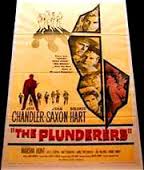
THE PLUNDERERS
US, 1960, 94 minutes, Black and white.
Jeff Chandler, John Saxon, Dolores Hart, Marsha Hunt, Jay C. Flippen, Ray Stricklyn, James Westerfield, Dee Pollock, Roger Torrey, Vaughn Taylor.
Directed by Joseph Pevney.
The Plunderers is an interesting western set after the American Civil War. It shows a group of young men after cattle drive who have been cheated of their money in Dodge City and who are resentful, picking a poor town, Trail City, down on its fortunes. They arrogantly set themselves up, demanding whiskey without paying, rooms in the local hotel, new clothes at the local store – again without paying.
The sheriff, Jay C. Flippen is a benign man but is no match for their arrogance. They beat the barman, Mike Westerfield. Everybody else is intimidated, including the past hero, Captain Sam, Jeff Chandler, who lost an arm in the war and is now settled on his farm, feeling himself a lesser man.
Ultimately, he takes a stand and is beaten, but is persuaded to come back to town, my former lover, Kate, Marsha Hunt, and the young daughter of the storekeeper, Dolores Hart.
At the time, the four young men reminded audiences of the contemporary juvenile delinquents in such films as The Wild One and The Blackboard Jungle.
The film shows a town defending itself, regaining some self-confidence. Jeff Chandler was to die two years later at age 42 and Dolores Hart became a nun, the prioress of her convent 50 years later.
1. A post-Civil War story? An old western town? The inhabitants, the years? The intrusion of the young group and their exercise of power?
2. The title, the reference to the young men, their attitudes, behaviour, plundering, oppression – and murder?
3. Commentators making the link to contemporary stories like Bad Day at Black Rock, The Wild One and juvenile delinquents?
4. The locations, black and white photography, the surroundings of the town, the town itself, saloon, hotel, sheriff’s office, farms, the streets? The musical score?
5. The action taking place over 36 hours, the commentary, the reflection by the people?
6. The four young men, their grievances after being cheated in Dodge City? Their attitude towards the town, the saloon, demanding whiskey, refusing to pay, Mike backing down? Sam observing? Their going to the store, with Waters and Ellie, the shirts, $73 and not paying? Going to the hotel, the encounter with Kate and Billy, the room, wanting to clean up, not paying? The return to the bar, demanding the food, bashing Mike, old Abilene, alcoholic, preparing the food to them, being on their side?
7. The young men themselves, Jeb, short, the leader, making decisions, callous, presumptuous? Davey, younger, being led, eventually standing up for himself and confronting Jeb? Mule, his size, arrogance, following Jeb’s lead? Hondo, Mexican, following on, with an eye for the ladies, his advances on Ellie, her reaction?
8. The reaction of the people, cowering, the young men pushing the women out of their path?
9. The Sheriff, a good man, older, not taking his gun, talking to the men, going to the hotel with his gun, their disrespect, making him leave? His eventually taking his gun – and Jeb shooting him?
10. The townspeople, Waters and the store, their taking Mike to the doctor, the various men from the bar?
11. Sam, the leader of the past, losing his arm in the Civil War, his thinking that he was not a complete man, observing, going out to his farm, the discussions with Kate and their past relationship, the attraction to Ellie? Coming into town, the confrontation and his being beaten, taken out to his farm, the men taking his wagon? Kate coming to get him, his return? His gathering the people together, exercising leadership?
12. The men in the bar, their fears, Hondo and his going out to Ellie, harassing her in the house, his being taken, in the barn, the knife, Ellie shooting him?
13. Davey, confronting Jeb, leaving, being taken, his weeping, the taunts of the men?
14. The confrontation in the streets, the shooting, the challenge to Mule to fight with his knife, his size, overcoming Sam, falling on the knife?
15. Jeb shooting, running, Sam on the ground, getting the gun, shooting Jeb?
16. Their letting Davey go, with the memory of what had happened?
17. Some new pride in the town, defending themselves, a future?
Published in Movie Reviews
Published in
Movie Reviews
Tagged under
Saturday, 18 September 2021 19:58
Mary, the Making of a Princess
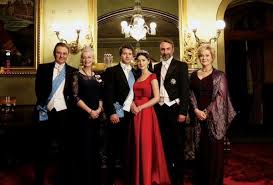
MARY, THE MAKING OF A PRINCESS
Australia, 2015, 90 minutes, Colour.
Emma Hamilton, Ryan O' Kane, Gig Clarke, Renae Small, Nicholas Hope, James Lugton, Shane Bryant, Angela Punch Mc Gregor, Leah Purcell.
Directed by Jennifer Leacey.
This is a film made for Australian television which should do well in English-speaking countries – and it would be interesting to know how well it fared in Denmark.
This is a film made for a television audience, with special appeal to a women’s audience, presented in commercial television style or in the tradition of women’s magazines like The Women’s Weekly or Women’s Day.
The film has attractive Sydney settings, Bondi Beach, the harbour, in the suburbs. There are also attractive scenes in Tasmania and at home in Hobart. Also included are scenes of Copenhagen, the city, Royal buildings – but, especially, the interiors both old and modern.
Mary Donaldson, Mary from Tassie, was working in Sydney when she was taken out with a group of friends to meet others at a club. She was somewhat reluctant but urged on by her friends. She encountered an attractive man called Fred (in comparing which was more sexually attractive a hairy chest or a hairless chest, Fred winning with hairless)! He expresses an interest in seeing her again and she gives him a card. It then emerges that he is the Crown Prince of Denmark. On going home, her friends Google him and learn that he is considered a Playboy Prince.
The Prince keeps in contact with Mary, they go out together, he going for in naked swim at the beach, coming to her home to dry his clothes and they spend the night together. Mary is still wary about him, but he declares that this is the first time that he has been in love.
Emma Hamilton plays Mary and New Zealander Ryan O’ Kane plays the Prince (his New Zealand background possibly helping him better with the Danish accent!).
While the relationship is secret, preserved while he is in Sydney, a Danish journalist becomes curious about his secret behaviour, contacts a Australian journalist (Leah Purcell) and soon the relationship is uncovered, with consequences for him, for his royal parents, the Danish population, the traditions, for the Crown Prince to marry someone outside Denmark.
While Mary keeps feet on the ground, despite the pressures on her, she goes to Denmark, accepting the Prince’s proposal, and undergoing an education in royal decorum, hairstyles and clothes, etiquette, Danish language… Which fails her when she doesn’t understand the sign and she is booked for parking in the wrong area.
Academic father, widowed, then finding a new companion who is congenial to Mary, is very protective of his daughter, writes to the Prince, who then comes to visit Tasmania at a family gathering. Her father gives Mary her mother’s wedding ring and by the side of the highway, the Prince proposes.
Nicholas Hope (Bad Boy Bubby) appears as the chief of protocol assisting the Prince, gradually mellowing with Mary. Shane Briant and Angela Punch Mc Gregor play the King and Queen of Denmark.
Despite all the hesitations, love prevails, the strong Mary giving the Prince support to perform his duty – with a film ending with friends gathering for the wedding, the wedding itself. The marriage took place in 2004.
Published in Movie Reviews
Published in
Movie Reviews
Tagged under
Saturday, 18 September 2021 19:58
Crow's Eggs, The/ Kaakkaa Muttai

THE CROW'S EGG/ KAAKKAA MUTTAI
India, 2014, 91 minutes, Colour.
Directed by M. Manikandan.
The Crows Egg is a Tamil film from the city of Chennai (formerly Madras). Films from the industries on India’s west coast, from Kolkotta and Chennai, tend to be dramas and comedies without the colourful romantic song and dance of Bollywood, from Mumbai and the east coast.
Many were surprised when Slumdog Millionaire won the Oscar for Best Film in 2008. Before and since there have been many slumdog films and this is one of them, something like Slumdog Pizza. Blog reports from India indicate that the Indian population really warms to this film.
The focus of the story is a family in the slums, father is in jail, mother works and tries to raise money to pay a lawyer to help get her husband out of jail (without any results). Her mother-in-law lives at home, sitting and getting older, giving advice to the two young boys who have to go out to collect coal, especially that falling from the trains as they pass, to get money for the family rather than go to school. There are quite a number of children with similar lives in these slums.
The boys, generally smiling, even when the younger one has problems, as in the opening of the film, with wetting his bed mat. The go out to play, give rice to the local crows and climb up to the nest so that they can drink the yolk from the crows’ eggs. They nickname themselves as Crow’s Egg.
Their lives are fairly routine, but, on the whole, they seem to enjoy them, not having had the opportunity to live better in any way. Until their playground is taken over, a building is put up and it turns out to be a Pizza Parlour. They have no idea what pizza is but they are attracted by the multi-coloured flyer, even persuading their grandmother to try to reproduce it.
They spend a lot of the film collecting the coal, helped by a friend who guides them to a government store and they gradually build up the money, only to be rejected at the Pizza Spot for being dirty urchins. Their next goal is to buy clothes so that they can be respectable as they try to get pizza.
In case this is too schmaltzy (which, in many ways, it is), there is a subplot about financial wheeler dealings to buy property, to put up buildings, to line the pockets of officials…
It comes to a head when the manager of the Pizza Spot actually punches the older boy – and it has been filmed on a mobile phone, leading to TV exposition, TV panels, discussions about the wealthy and the poor, politicians getting in on the act, locals trying to extort money from the Pizza boss, and, without spoiling the ending, no surprise when they get a free pizza (and then turn up their noses at it).
A family film, more attuned to family audiences and younger audiences than Slumdog Millionaire, audiences identifying with the boys who, for most of the film, seem to have as their goal, money, money, money – but, of course, they discover their generosity at the end.
1. Audience response to films from India? A Tamil film? From the city of Chennai?
2. The Chennai settings, the slum areas, passageways, homes, ramshackle, yet centres for the family, the extended family, the making of meals, washing, sleeping arrangements, the local authorities making television sets available – and the locals enjoying the television programmes?
3. The popularity of Slumdog Millionaire? This film in the tradition? The boys in the slums, the details of their lives, no school, collecting coal to get money, the goal of eating pizza?
4. Colour photography, the details of the city, homes, settlements, open spaces for play, the new buildings? The trains passing by? The coal store? The musical score?
5. The family situation, the father in jail, the visits by his wife, his attitude and concern, her concern, worried about his health and condition, working hard, giving the money to the lawyer, the links with the local politicians and her visit, no results? The mother-in-law, sitting at home, saying she was just eating and sleeping, her advice to the two boys, making the pizza and their not liking it? The two boys, their ages, the boy wetting his bed mat, going out, playing, feeding the crows the rice, finding the eggs, one each in one for the crows? Drinking the eggs? Naming themselves Crow’s Egg? Collecting the coal, selling it? Their meeting with Fruit Juice, chatting, his telling them where the coal was, their collecting so much, making the money, going back to find him, his being fired, finding him at the end? The relationship with the other boys and girls? The issue of mobile phones, with poles hitting the passengers passing on the trains and collecting the phones? The local authorities giving away television sets?
6. The businessmen, the playground, fencing it off, the deals with the politicians, the boss, his associates and their kowtowing to him, his schoolfriend always laughing and his rebuking him? The building, the pizza parlour, the opening, the superstar coming to eat, the cameras, everybody cheering including the children? Seeing him eat? The colourful flyers, the high prices? The boys in their determination to eat pizza, their mother’s refusal, the grandmother’s attempts? The pizza delivery boy and their helping him and looking and smelling the pizza?
7. The meeting with the rich boy, talking with him, his offering them some pizza and their refusal, going to the parlour, being rejected as urchins, the need for better clothes, advice from the rich boy, going on the bus, to the city, meeting the rich boys who wanted to eat something special and their father refusing, the brothers buying their clothes?
8. Going to the pizza parlour, the manager and the police security, the refusal of the manager, the manager hitting the boy – and its being filmed?
9. The man who brought the coal, his associate, going to the owner, the deal with the money, low expectations for money, the offering of 100,000 rupees, his not telling his associate who sold it to the TV, the sequences appearing on TV, the panels, the discussions, the repetitions, the boy’s mother finally seeing it?
10. The negotiations, the local politician and his intervention? The search for the boys, their running away, with Fruit Juice? Their being brought back?
11. The boys at the parlour, the media, their being welcome as celebrities, the owner greeting them, free pizza – and then not liking the taste!
12. A glimpse of an Indian city, families, the slums, hopes and aspirations?
Published in Movie Reviews
Published in
Movie Reviews
Tagged under